Zoom
Trash

INTP. Originally published in Wholeness Lies WithinCopyright © 1986-2002, Terence Duniho; © 2002-2010, Fergus Duniho The following description was written by my father and may reflect some of his personal experience with me, but he also spent plenty of time gaining firsthand knowledge of all the types through type conferences and workshops, and I was by no means the only member of my type known to him.
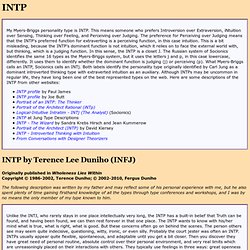
During the mid 20th century, Carl Jung identified eight personality types and divided them into sixteen subtypes. My type is Introverted Thinker [Ti], and my subtype relies on Extraverted Intuition [Ne] as an auxiliary function. The MBTI calls this type INTP, while Socionics calls it INTj. These are mere semantic differences between two theories derived from the same original work. Introversion Rather than beginning with proof positive that this is my type, I will work up to it. The psychologist Hans Eyesenck gave a physiological model for understanding introversion vs. extraversion. Myers-Briggs Type Indicator.
Model of personality types A chart with descriptions of each Myers–Briggs personality type and the four dichotomies central to the theory The Myers–Briggs Type Indicator (MBTI) is an introspective self-report questionnaire indicating differing psychological preferences in how people perceive the world and make decisions.[1][2][3] The original versions of the MBTI were constructed by two Americans, Katharine Cook Briggs and her daughter Isabel Briggs Myers.[4] The MBTI is based on the conceptual theory proposed by Swiss psychiatrist Carl Jung,[5] who had speculated that people experience the world using four principal psychological functions – sensation, intuition, feeling, and thinking – and that one of these four functions is dominant for a person most of the time.[6] The four categories are Introversion/Extraversion, Sensing/Intuition, Thinking/Feeling, Judging/Perception.
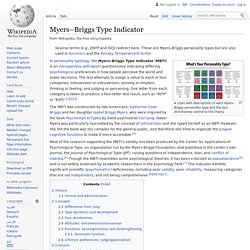
Each person is said to have one preferred quality from each category, producing 16 unique types. History[edit] Gifts Differing: Understanding Personality Type. Gifts Differing: Understanding Personality Type is a book written by Isabel Briggs Myers with Peter B.
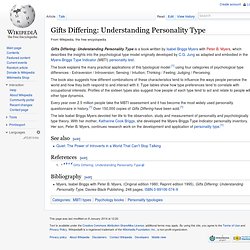
Myers, which describes the insights into the psychological type model originally developed by C.G. Jung as adapted and embodied in the Myers-Briggs Type Indicator (MBTI) personality test. The book explains the many practical applications of this typological model [1] using four categories of psychological type differences - Extraversion / Introversion; Sensing / Intuition; Thinking / Feeling; Judging / Perceiving. The book also suggests how different combinations of these characteristics tend to influence the ways people perceive the world and how they both respond to and interact with it. Type tables show how type preferences tend to correlate with occupational interests.
Every year over 2.5 million people take the MBTI assessment and it has become the most widely used personality questionnaire in history.[1] Over 150,000 copies of Gifts Differing have been sold.[1] See also[edit] Estimated Frequencies of Types. The Sixteen Personality Types - High-Level. ISTJ - The Duty Fulfiller Serious and quiet, interested in security and peaceful living.

Extremely thorough, responsible, and dependable. Well-developed powers of concentration. Usually interested in supporting and promoting traditions and establishments. Well-organized and hard working, they work steadily towards identified goals. Click here for a detailed description of ISTJ. Crafter (role variant) Crafters are tactical operators, concrete in speech and utilitarian in action.
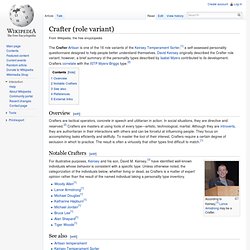
In social situations, they are directive and reserved.[2] Crafters are masters at using tools of every type—artistic, technological, martial. Although they are introverts, they are authoritarian in their interactions with others and can be forceful at influencing people. They focus on accomplishing tasks efficiently and skillfully. To master the tool of their interest, Crafters require a certain degree of seclusion in which to practice. The result is often a virtuosity that other types find difficult to match.[1] For illustrative purposes, Keirsey and his son, David M.
Promoter (role variant) The Promoter Artisan is one of the 16 role variants of the Keirsey Temperament Sorter,[1] a self-assessed personality questionnaire designed to help people better understand themselves.
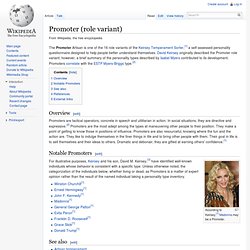
David Keirsey originally described the Promoter role variant; however, a brief summary of the personality types described by Isabel Myers contributed to its development. Promoters correlate with the ESTP Myers-Briggs type.[2] Promoters are tactical operators, concrete in speech and utilitarian in action. In social situations, they are directive and expressive.[2] Promoters are the most adept among the types at maneuvering other people to their position. They make a point of getting to know those in positions of influence. For illustrative purposes, Keirsey and his son, David M. Protector (role variant)
The Protector Guardian is one of the 16 role variants of the Keirsey Temperament Sorter,[1] a self-assessed personality questionnaire designed to help people better understand themselves.
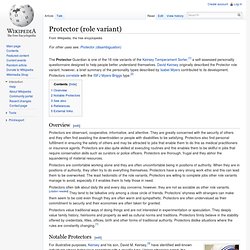
David Keirsey originally described the Protector role variant; however, a brief summary of the personality types described by Isabel Myers contributed to its development. Protectors correlate with the ISFJ Myers-Briggs type.[2] Protectors are observant, cooperative, informative, and attentive. They are greatly concerned with the security of others and they often find assisting the downtrodden or people with disabilities to be satisfying. Protectors also find personal fulfillment in ensuring the safety of others and may be attracted to jobs that enable them to do this as medical practitioners or insurance agents. Protectors are comfortable working alone and they are often uncomfortable being in positions of authority. For illustrative purposes, Keirsey and his son, David M.
Provider (role variant) The Provider Guardian is one of the 16 role variants identified in the Keirsey Temperament Sorter,[1] a self-assessed personality questionnaire designed to help people better understand themselves.
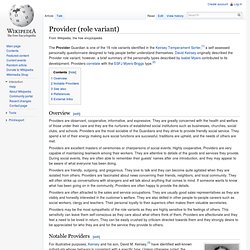
David Keirsey originally described the Provider role variant; however, a brief summary of the personality types described by Isabel Myers contributed to its development. Providers correlate with the ESFJ Myers-Briggs type.[2] Providers are observant, cooperative, informative, and expressive. They are greatly concerned with the health and welfare of those under their care and they are the nurturers of established social institutions such as businesses, churches, social clubs, and schools.
Providers are the most sociable of the Guardians and they strive to provide friendly social service. Providers are excellent masters of ceremonies or chairpersons of social events. Providers are friendly, outgoing, and gregarious. Providers are often attracted to the sales and service occupations. Inspector (role variant)
The Inspector Guardian is one of the 16 role variants of the Keirsey Temperament Sorter,[1] a self-assessed personality questionnaire designed to help people better understand themselves.
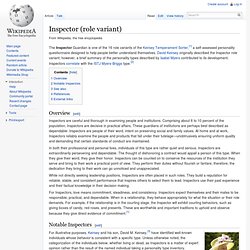
David Keirsey originally described the Inspector role variant; however, a brief summary of the personality types described by Isabel Myers contributed to its development. Inspectors correlate with the ISTJ Myers-Briggs type.[2] Inspectors are careful and thorough in examining people and institutions. Comprising about 6 to 10 percent of the population, Inspectors are decisive in practical affairs. These guardians of institutions are perhaps best described as dependable: Inspectors are people of their word, intent on preserving social and family values. In both their professional and personal lives, individuals of this type are rather quiet and serious.
While not directly seeking leadership positions, Inspectors are often placed in such roles. For illustrative purposes, Keirsey and his son, David M. Supervisor (role variant) The Supervisor Guardian is one of the 16 role variants of the Keirsey Temperament Sorter,[1] a self-assessed personality questionnaire designed to help people better understand themselves.
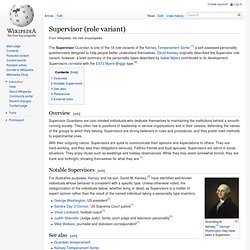
David Keirsey originally described the Supervisor role variant; however, a brief summary of the personality types described by Isabel Myers contributed to its development. Supervisors correlate with the ESTJ Myers-Briggs type.[2] Supervisor Guardians are civic-minded individuals who dedicate themselves to maintaining the institutions behind a smooth-running society. They often rise to positions of leadership in service organizations and in their careers, defending the values of the groups to which they belong. Supervisors are strong believers in rules and procedures, and they prefer tried methods to experimental ones. With their outgoing nature, Supervisors are quick to communicate their opinions and expectations to others. For illustrative purposes, Keirsey and his son, David M. Architect (role variant) The Architect Rational is one of the 16 role variants of the Keirsey Temperament Sorter, a self-assessed personality questionnaire designed to help people better understand themselves.
David Keirsey originally described the Architect role variant; however, a brief summary of the personality types described by Isabel Myers contributed to its development. Architects correlate primarily with the Myers-Briggs type INTP.[1] Architects are logically and verbally precise. In casual conversations, they may be tempted to point out errors the other speaker makes, with the simple goal of maintaining clarity within the exchange.
In serious discussions, Architects' abilities to detect distinctions, inconsistencies, contradictions, and frame arguments gives them an enormous advantage. Architects tend to analyze the world in depth. Credentials or other forms of traditional authority do not impress Architects. Inventor (role variant) The Inventor Rational is one of the 16 role variants of the Keirsey Temperament Sorter, a self-assessed personality questionnaire designed to help people better understand themselves. David Keirsey originally described the Inventor role variant; however, a brief summary of the personality types described by Isabel Myers contributed to its development.[1] Inventors correlate primarily with the Myers-Briggs type ENTP.[2] Inventors tend to be introspective, pragmatic, informative, and expressive.
They can become highly skilled in functional engineering and invention. Of all the role variants, Inventors are the most resistant to doing things a certain way just because it was done that way in the past. Designing and improving mechanisms and products is their constant goal. Though full of ideas, Inventors are primarily interested in those that can be put into action or used to make products. For illustrative purposes, Keirsey and his son, David M. Mastermind (role variant) The Mastermind Rational is one of the 16 role variants of the Keirsey Temperament Sorter, a self-assessed personality questionnaire designed to help people better understand themselves. David Keirsey originally described the Mastermind role variant; however, a brief summary of the personality types described by Isabel Myers contributed to its development.
Masterminds correlate primarily with the Myers-Briggs type INTJ.[1] They make up about 1% of the population.[2] Masterminds are introspective, logical, rational, pragmatic, clear-headed, directive, and attentive. As strategists, they are better than any other type at brainstorming approaches to situations. Masterminds are capable but not eager leaders, stepping forward only when it becomes obvious to them that they are the best for the job. Masterminds are highly pragmatic, and they will put forth a great deal of time and effort to implement effective ideas.
Composer (role variant) MoodleThe Composer Artisan is one of the 16 role variants of the Keirsey Temperament Sorter,[1] a self-assessed personality questionnaire designed to help people better understand themselves. David Keirsey originally described the Composer role variant; however, a brief summary of the personality types described by Isabel Myers contributed to its development.
Composers correlate with the ISFP Myers-Briggs type.[2] Composers are tactical entertainers, concrete in speech and utilitarian in action. In social situations, they are informative and attentive.[2] Grounded in the here and now, Composers are extremely sensitive to their environment. They are attuned to the perceptions of their five senses even more than other sensing types are. For illustrative purposes, Keirsey and his son, David M. Performer (role variant) The Performer Artisan is one of the 16 role variants of the Keirsey Temperament Sorter,[1] a self-assessed personality questionnaire designed to help people better understand themselves. David Keirsey originally described the Performer role variant; however, a brief summary of the personality types described by Isabel Myers contributed to its development. Performers correlate with the ESFP Myers-Briggs type.[2] Performers are tactical entertainers, concrete in speech and utilitarian in action.
In social situations, they are informative and expressive.[2] The most fun-loving of all the types, Performers excel at delighting others with their artistry and humor. They continually seek stimulating experiences with those around them. Bill Clinton may be a Performer. Healer (role variant) Champion (role variant) Fieldmarshal (role variant) Counselor (role variant) Teacher (role variant) Carl Jung. Carl Gustav Jung (/jʊŋ/; German: [ˈkarl ˈɡʊstaf jʊŋ]; 26 July 1875 – 6 June 1961), often referred to as C. G. Jung, was a Swiss psychiatrist and psychotherapist who founded analytical psychology.[2] Myers-Briggs Type Indicator. Isabel Briggs Myers. Isabel Briggs Myers (October 18, 1897 – May 5, 1980[1][2]) was an American author and co-creator of a personality inventory known as the Myers-Briggs Type Indicator (MBTI).
Briggs Myers created the MBTI with her mother, Katharine Cook Briggs. MBTI personality test[edit] Briggs Myers implemented Jung's ideas and added her own insights. She then created a paper survey which would eventually become the MBTI.